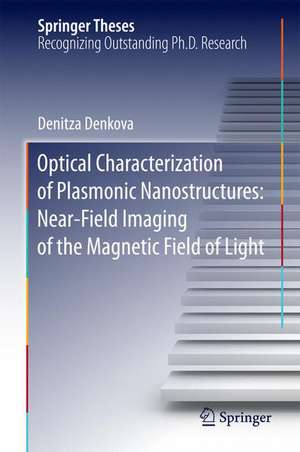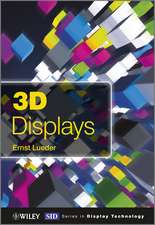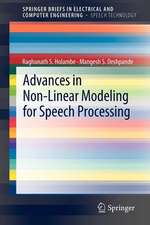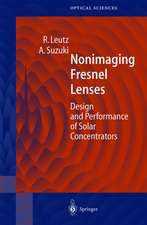Optical Characterization of Plasmonic Nanostructures: Near-Field Imaging of the Magnetic Field of Light: Springer Theses
Autor Denitza Denkovaen Limba Engleză Hardback – 29 apr 2016
This thesis focuses on a means of obtaining, for the first time, full electromagnetic imaging of photonic nanostructures. The author also develops a unique practical simulation framework which is used to confirm the results.
The development of innovative photonic devices and metamaterials with tailor-made functionalities depends critically on our capability to characterize them and understand the underlying light-matter interactions. Thus, imaging all components of the electromagnetic light field at nanoscale resolution is of paramount importance in this area. This challenge is answered by demonstrating experimentally that a hollow-pyramid aperture probe SNOM can directly image the horizontal magnetic field of light in simple plasmonic antennas – rod, disk and ring. These results are confirmed by numerical simulations, showing that the probe can be approximated, to first order, by a magnetic point-dipole source. This approximation substantially reduces the simulation time and complexity and facilitates the otherwise controversial interpretation of near-field images. The validated technique is used to study complex plasmonic antennas and to explore new opportunities for their engineering and characterization.
The development of innovative photonic devices and metamaterials with tailor-made functionalities depends critically on our capability to characterize them and understand the underlying light-matter interactions. Thus, imaging all components of the electromagnetic light field at nanoscale resolution is of paramount importance in this area. This challenge is answered by demonstrating experimentally that a hollow-pyramid aperture probe SNOM can directly image the horizontal magnetic field of light in simple plasmonic antennas – rod, disk and ring. These results are confirmed by numerical simulations, showing that the probe can be approximated, to first order, by a magnetic point-dipole source. This approximation substantially reduces the simulation time and complexity and facilitates the otherwise controversial interpretation of near-field images. The validated technique is used to study complex plasmonic antennas and to explore new opportunities for their engineering and characterization.
| Toate formatele și edițiile | Preț | Express |
|---|---|---|
| Paperback (1) | 631.53 lei 43-57 zile | |
| Springer International Publishing – 22 apr 2018 | 631.53 lei 43-57 zile | |
| Hardback (1) | 637.59 lei 43-57 zile | |
| Springer International Publishing – 29 apr 2016 | 637.59 lei 43-57 zile |
Din seria Springer Theses
- 18%
 Preț: 997.88 lei
Preț: 997.88 lei -
 Preț: 389.88 lei
Preț: 389.88 lei - 15%
 Preț: 646.94 lei
Preț: 646.94 lei - 18%
 Preț: 943.43 lei
Preț: 943.43 lei -
 Preț: 399.29 lei
Preț: 399.29 lei - 18%
 Preț: 944.99 lei
Preț: 944.99 lei - 15%
 Preț: 636.80 lei
Preț: 636.80 lei - 18%
 Preț: 941.05 lei
Preț: 941.05 lei - 15%
 Preț: 643.16 lei
Preț: 643.16 lei - 15%
 Preț: 642.68 lei
Preț: 642.68 lei - 18%
 Preț: 1103.62 lei
Preț: 1103.62 lei - 20%
 Preț: 558.82 lei
Preț: 558.82 lei - 18%
 Preț: 1112.30 lei
Preț: 1112.30 lei - 18%
 Preț: 944.19 lei
Preț: 944.19 lei - 18%
 Preț: 1109.92 lei
Preț: 1109.92 lei - 18%
 Preț: 1217.27 lei
Preț: 1217.27 lei - 15%
 Preț: 640.06 lei
Preț: 640.06 lei - 15%
 Preț: 636.45 lei
Preț: 636.45 lei - 15%
 Preț: 640.06 lei
Preț: 640.06 lei - 15%
 Preț: 640.88 lei
Preț: 640.88 lei -
 Preț: 389.70 lei
Preț: 389.70 lei - 20%
 Preț: 563.89 lei
Preț: 563.89 lei -
 Preț: 393.35 lei
Preț: 393.35 lei - 15%
 Preț: 637.93 lei
Preț: 637.93 lei - 15%
 Preț: 641.85 lei
Preț: 641.85 lei - 18%
 Preț: 1225.94 lei
Preț: 1225.94 lei - 20%
 Preț: 551.36 lei
Preț: 551.36 lei - 18%
 Preț: 1229.10 lei
Preț: 1229.10 lei - 15%
 Preț: 639.25 lei
Preț: 639.25 lei - 18%
 Preț: 999.45 lei
Preț: 999.45 lei - 15%
 Preț: 640.06 lei
Preț: 640.06 lei - 18%
 Preț: 1220.45 lei
Preț: 1220.45 lei - 18%
 Preț: 1116.26 lei
Preț: 1116.26 lei - 18%
 Preț: 1110.72 lei
Preț: 1110.72 lei - 18%
 Preț: 1000.87 lei
Preț: 1000.87 lei - 18%
 Preț: 891.17 lei
Preț: 891.17 lei - 15%
 Preț: 640.06 lei
Preț: 640.06 lei - 5%
 Preț: 1154.07 lei
Preț: 1154.07 lei - 15%
 Preț: 635.96 lei
Preț: 635.96 lei - 15%
 Preț: 640.88 lei
Preț: 640.88 lei -
 Preț: 387.20 lei
Preț: 387.20 lei - 18%
 Preț: 1109.92 lei
Preț: 1109.92 lei -
 Preț: 385.25 lei
Preț: 385.25 lei -
 Preț: 385.25 lei
Preț: 385.25 lei - 18%
 Preț: 1112.30 lei
Preț: 1112.30 lei - 18%
 Preț: 999.45 lei
Preț: 999.45 lei -
 Preț: 386.99 lei
Preț: 386.99 lei - 15%
 Preț: 637.13 lei
Preț: 637.13 lei - 20%
 Preț: 554.20 lei
Preț: 554.20 lei - 20%
 Preț: 555.57 lei
Preț: 555.57 lei
Preț: 637.59 lei
Preț vechi: 750.11 lei
-15% Nou
Puncte Express: 956
Preț estimativ în valută:
122.01€ • 126.61$ • 101.98£
122.01€ • 126.61$ • 101.98£
Carte tipărită la comandă
Livrare economică 17-31 martie
Preluare comenzi: 021 569.72.76
Specificații
ISBN-13: 9783319287928
ISBN-10: 3319287923
Pagini: 90
Ilustrații: XXVI, 88 p. 36 illus., 35 illus. in color.
Dimensiuni: 155 x 235 x 8 mm
Greutate: 0.34 kg
Ediția:1st ed. 2016
Editura: Springer International Publishing
Colecția Springer
Seria Springer Theses
Locul publicării:Cham, Switzerland
ISBN-10: 3319287923
Pagini: 90
Ilustrații: XXVI, 88 p. 36 illus., 35 illus. in color.
Dimensiuni: 155 x 235 x 8 mm
Greutate: 0.34 kg
Ediția:1st ed. 2016
Editura: Springer International Publishing
Colecția Springer
Seria Springer Theses
Locul publicării:Cham, Switzerland
Public țintă
ResearchCuprins
Introduction.- Imaging the Magnetic Near-field of Plasmon Modes in Bar Antennas.- A Near-Field-Aperture Probe as an Optical Magnetic Source and Detector .- Magnetic Near-Field Imaging of Increasingly Complex Plasmonic Antennas.- Plasmon-Enhanced Sub-wavelength Laser Ablation: Plasmonic Nano-Jets.- Conclusions and Outlook.
Notă biografică
Denitza Denkova completed her Bachelor (2008) and Master (2010) studies in Physics at Sofia University, Bulgaria. During her studies she also worked part-time as an engineer at Melexis, a microelectronics company. In a joint project between these institutions she studied specific malfunctions in microelectronics circuits via various structural, optical and electrical characterization techniques, including the development of a cathodoluminescence add-on to a scanning electron microscope. Denitza then moved to KU Leuven, Belgium to further develop her interest in nanoscale characterization as a PhD. There she developed and applied a novel approach for imaging the magnetic field of light with nanoscale resolution, in the context of characterization of plasmonic and metamaterial devices.
Textul de pe ultima copertă
This thesis focuses on a means of obtaining, for the first time, full electromagnetic imaging of photonic nanostructures. The author also develops a unique practical simulation framework which is used to confirm the results.
The development of innovative photonic devices and metamaterials with tailor-made functionalities depends critically on our capability to characterize them and understand the underlying light-matter interactions. Thus, imaging all components of the electromagnetic light field at nanoscale resolution is of paramount importance in this area. This challenge is answered by demonstrating experimentally that a hollow-pyramid aperture probe SNOM can directly image the horizontal magnetic field of light in simple plasmonic antennas – rod, disk and ring. These results are confirmed by numerical simulations, showing that the probe can be approximated, to first order, by a magnetic point-dipole source. This approximation substantially reduces the simulation time andcomplexity and facilitates the otherwise controversial interpretation of near-field images. The validated technique is used to study complex plasmonic antennas and to explore new opportunities for their engineering and characterization.
The development of innovative photonic devices and metamaterials with tailor-made functionalities depends critically on our capability to characterize them and understand the underlying light-matter interactions. Thus, imaging all components of the electromagnetic light field at nanoscale resolution is of paramount importance in this area. This challenge is answered by demonstrating experimentally that a hollow-pyramid aperture probe SNOM can directly image the horizontal magnetic field of light in simple plasmonic antennas – rod, disk and ring. These results are confirmed by numerical simulations, showing that the probe can be approximated, to first order, by a magnetic point-dipole source. This approximation substantially reduces the simulation time andcomplexity and facilitates the otherwise controversial interpretation of near-field images. The validated technique is used to study complex plasmonic antennas and to explore new opportunities for their engineering and characterization.
Caracteristici
Nominated as an outstanding Ph.D. thesis by the Catholic University of Leuven, Belgium Fills the last gap in achieving full electromagnetic imaging of photonic nanostructures Proposed technique offers numerous advantages including use of commercially available platform and no requirement for data post-processing Unique practical simulation framework using an approximation that greatly reduces the simulation time, memory and complexity Includes supplementary material: sn.pub/extras













